Good morning!
Greetings in the name of the father, the son, and the Holy Spirit.
Fear not, for I am with you; be not dismayed, for I am your God; I will strengthen you, I will help you, I will uphold you with my righteous right hand. (Isaiah 41:10)
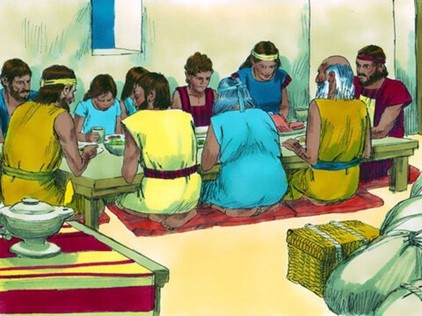
While the Israelites were still in the land of Egypt as slaves, God, the LORD, gave the following instructions to Moses and Aaron, “Be fully dressed, wear your sandals, and carry your walking stick in your hand. Eat the meal with urgency, for this is the LORD’s Passover. On that night, I will pass through the land of Egypt and strike down every firstborn son and firstborn male animal in the land of Egypt. I will execute judgment against all the gods of Egypt, for I am the LORD! But the blood on your doorposts will serve as a sign, marking the houses where you are staying. When I see the blood, I will pass over you. This plague of death will not touch you when I strike the land of Egypt.
Then Moses called all the elders of Israel together and said to them, “Go, pick out a lamb or young goat for each of your families, and slaughter the Passover animal. Then take a bundle of hyssop branches and dip it into the blood. Brush the hyssop across the top and sides of the doorframes of your houses. And no one may go out through the door until morning. For the LORD will pass through the land to strike down the Egyptians. But when he sees the blood on the top and sides of the doorframe, the LORD will pass over your home. He will not permit His death angel to enter your house and strike you down.”
So the people of Israel did just as the LORD had commanded through Moses and Aaron. And that night at midnight, the LORD struck down all the firstborn sons in the land of Egypt, from the firstborn son of Pharaoh, who sat on his throne, to the firstborn son of the prisoner in the dungeon. Even the firstborn of their livestock were killed. Pharaoh and all his officials and all the people of Egypt woke up during the night, and loud wailing was heard throughout the land of Egypt. There was not a single house where someone had not died.
Pharaoh sent for Moses and Aaron during the night. “Get out!” he ordered. “Leave my people—and take the rest of the Israelites with you! Go and worship the LORD as you have requested. Take your flocks and herds, as you said, and be gone. Go, but bless me as you leave.” All the Egyptians urged the people of Israel to get out of the land as quickly as possible, for they thought, “We will all die!”

That night the people of Israel left Rameses and started for Succoth. There were about 600,000 men, plus all the women and children. A rabble of non-Israelites went with them, along with great flocks and herds of livestock.
The people of Israel had lived in Egypt for 430 years. In fact, it was on the last day of the 430th year that all the LORD’s forces left the land. On this night, the LORD kept his promise to bring his people out of the land of Egypt, which was made with Abraham, Isaac, and Jacob.
When Pharaoh finally let the people go, God did not lead them along the main road that runs through Philistine territory, even though that was the shortest route to the Promised Land. Why did God lead the Israelites in this way? What God did to the Israelites could be one of the mysteries of God. In reality, it is the true beauty of walking with God. We will continue exploring this mystery to see the most profound truth.
Here is what God said to Moses: “If the people face a battle as going into the Promised Land, they might change their minds and return to Egypt.” Moses, who had just completed his 40-year detour with God, fully understood. Moses knew that without the detour, Moses could not have been the Moses who was about to lead the Israelites out of Egypt. Moses silently listened to God. What God told Moses was absolutely true, and then Moses obeyed.
Moses directed the Israelites, and God led them in a roundabout way through the wilderness toward the Red Sea. So far, nobody questioned or argued with Moses while telling why Moses led this way and why not the way they thought was straight and direct to the Promised Land. But the Israelites followed Moses like an army ready for battle because they saw God’s power. Wherever Moses led, they followed. All were as obedient to Moses as Moses to God. And God was ahead of them. What a beautiful scene it was! Even today, we can see the same beautiful scene. God leads, and His people follow. God protects and provides all that His people need.
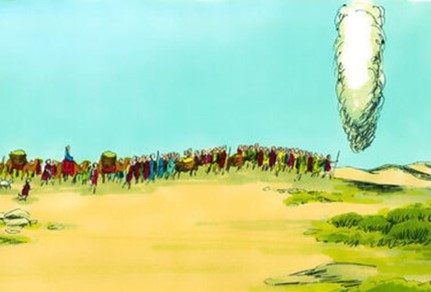
The Israelites left Succoth and camped at Etham on the edge of the wilderness. The LORD went ahead of them. He guided them during the day with a pillar of cloud and provided light at night with a pillar of fire. This allowed them to travel by day or by night. And the LORD did not remove the pillar of cloud or pillar of fire from its place in front of the people. It was what God did in His unfathomable love. They loved God’s protection also, which pleased God. They joyfully walked with God as God led. Everything worked exceedingly well in the eyes of the Israelites.
Then the LORD gave these instructions to Moses: “Order the Israelites to turn back and camp by Pi-hahiroth between Migdol and the sea. Camp there along the shore, across from Baal-zephon. Moses faithfully followed God’s command. He made the entire Israelites turn back and camp along the coast. It was not a desirable place to camp because there was no way to escape. If the Egyptians attacked them from inland, they would be trapped in between the Red Sea and the Egyptian army. Even so, Moses obeyed, and they also obeyed. None complained.
Then God came to Moses and explained God’s plan, “Pharaoh will think, ‘The Israelites are confused. They are trapped in the wilderness!’ And once again, I will harden Pharaoh’s heart, and he will chase after you. I have planned this in order to display my glory through Pharaoh and his whole army. After this, the Egyptians will know that I am the LORD!”

So the Israelites camped there as they were told. They remained along the shore. The Israelites were happy and joyful in faith in God, but their faith had never been tested.
These trials will show that your faith is genuine. It is being tested as fire tests and purifies gold—though your faith is far more precious than mere gold. So when your faith remains strong through many trials, it will bring you much praise and glory and honor on the day when Jesus Christ is revealed to the whole world. (1 Peter 1:7)
Faith needs trials. And our faith is purified and refined by life trials as solid gold by fire. Without them, we really don’t know whether we have the faith to endure trials or not.
When word reached the king of Egypt that the Israelites had left Egypt, Pharaoh and his officials changed their minds. “What have we done, letting all those Israelite slaves get away?” they asked. So Pharaoh harnessed his chariot and called up his troops. He took with him 600 of Egypt’s best chariots, along with the rest of the chariots of Egypt, each with its commander. It is more like gathering the best main battle tanks and sending them to the frontline in modern warfare. Pharaoh assembled the best army with the best warfighting equipment and chased after the people of Israel, who had left with fists raised in defiance. The Egyptians chased after them with all the forces in Pharaoh’s army—all his horses and chariots, charioteers, and troops. The Egyptians caught up with the people of Israel as they were camped beside the shore near Pi-hahiroth, across from Baal-zephon. To Pharaoh’s eyes, the Israelites were stupid enough to camp along the shore, which made Pharaoh delighted. The Israelites had no way to run away from his army.
As Pharaoh approached, the people of Israel started hearing the noises made by Pharaoh’s army. They remembered the Egyptian army’s powerful horses and fearful chariots. Before the mighty army, their heart melted like ice on a hot summer day. They felt like ants about being squashed by a gigantic foot. They had no battle-trained horses, no invincible chariots, and no trained and fully armed troops to defend against the Pharaoh’s world’s best army at that time. The outcome was so obvious. Then, they looked back and saw the Red Sea. There was no place to go but to get killed by the swords of Pharaoh’s army or surrender to the army to be back to enslaved people to Egyptians.
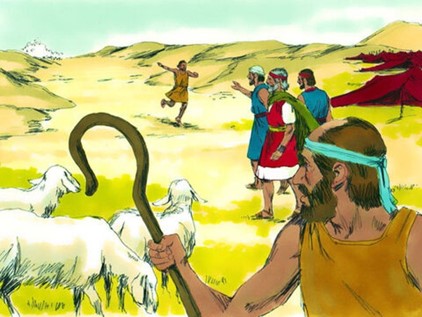
The noise was getting louder and louder. The horses and the chariots were dashing toward them, and Pharaoh was at the front leading his army. The Israelites realized the danger was quickly coming, and the noise was getting louder and louder. It was thundering, and they felt the earth was shaking because of the massive army of houses and chariots.
Then they looked at each other and panicked. The Egyptians were quickly overtaking them. So far, they were joyful and happy, although they camped along the shore. They were thankful to God, and they believed in God. They put 100% trust in God, and they believed soon they would be in the Promised Land because they saw God’s mighty power. All vividly remembered and talked about what God had done to the Egyptians on that night. God killed all Egyptians’ firstborn sons. Thus, until they saw the Pharaoh’s army chasing them, they felt they strongly believed in God while expecting they would go into and inherit the Promised Land without the slightest doubt.
However, what did happen to them when Pharaoh’s army, the world’s most powerful army, was quickly running toward them with horses, chariots, swords, and spears? What was the response of the Israelites? Did anyone talk about what God did for them in Egypt when they saw the Pharaoh’s army chasing them? Is there even a single person to talk about God who would rescue them again from the Pharaoh’s army? No.
All focused their eyes on Pharaoh’s fearful army, not God, who rescued them from Pharaoh with His mighty arm. Now, we can see why God did not take them directly to the Promised Land. They did not have faith in inheriting the Promised Land.
In a panic, the Israelites loudly complained to Moses, indeed, to God,
“Why did you bring us out here to die in the wilderness? Weren’t there enough graves for us in Egypt? What have you done to us? Why did you make us leave Egypt? Didn’t we tell you this would happen while we were still in Egypt? We said, ‘Leave us alone! Let us be slaves to the Egyptians. It’s better to be a slave in Egypt than a corpse in the wilderness!’” (Exodus 14:11b-12)
How many times did we complain to God as the Israelites did? When everything was good, we praised God and gave thanks to God. However, how did we respond when the situation changed and everything quickly went against us, giving us pain and misery? Were we different from the Israelites who panicked and complained to God before the readily approaching Pharaoh’s army? Yes, we all panicked and complained to God like the Israelites.
If so, is the faith that we have real? Or is it our mere feeling about God? When everything is good, we feel good. When things get worse, we feel bad. Then we search for the answer to why we got pain and misery. Then who is the most frequent target we choose and complain? Isn’t it God, as the Israelites did?
So you see, faith by itself isn’t enough. Unless it produces good deeds, it is dead and useless. (James 2:17)
Faith without proof is not true faith. Without evidence, we cannot tell whether our faith is real. We will only truly know our faith when things in life get worse, which puts us in pain and misery. Surely all Israelites believed in God and thought they had faith in God, but in reality, they didn’t. It was more or less just their feeling about God. When they got good things, they believed in God. When they did not get what they wanted, they complained to God and doubted. Such faith is useless.
What would be your response to the uncontrollable and huge complaint shouted by the Israelites in unison if you were Moses? Was it made you crazy? Or did you calmly remember the past forty years with God in the Midian and calm the crowd angrily complaining? Please take a minute and try to answer yourself.
Here is how Moses responded. Moses told the people,
“Don’t be afraid. Just stand still and watch the LORD rescue you today. The Egyptians you see today will never be seen again. The LORD himself will fight for you. Just stay calm.” (Exodus 14:13b-14)
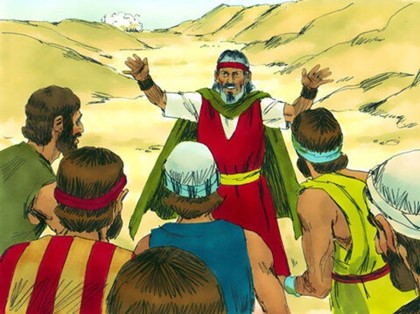
What a faithful response of Moses! Moses had great faith that none of the 2,000,000 Israelites had. It was the reason why God chose Moses after Moses went through the special 40-year walk with God in the Midian wilderness.
By the way, Moses’ answer was not just faithful but also truly logical.
First, who did kill all firstborn Egyptian sons? God. Was Pharaoh able to compete against God? No. Was Pharaoh able to stop even one single plague out of the ten that fell on his country? No. Then was panicking and complaining to God the logical response of the Israelites? Logically, they should not have feared Pharaoh and his army because Pharaoh could not match against God, and God was with them.
Often many of us think faith is illogical. The Israelites’ fear was ungrounded, and their behavior was illogical.
Second, on what should the Israelites have focused? Pharaoh and his army rapidly approaching, or God and His almighty hand that they experienced only a few days ago? They left Egypt because God and His mighty hand hit hard on the Egyptians. Should they focus on God’s mighty hand, and look forward to seeing God’s hand again? Focusing on fearful Pharaoh’s army only escalated their fear of Pharaoh’s army.
Let’s ask ourselves. When a disastrous event came into our lives, on what did we focus our eyes? Did we fix our eyes on the dreadful disaster coming at us with unbearable pain and agony or on our God, the Ever-loving Father, who has protected us from all harms with His mighty hand?
Moses learned and knew what to do – not to panic, and what to see – not focusing on the Pharaoh’s army coming with swords and spears. Instead, Moses fixed his eyes on God, who lovingly and patiently walked with him for the last 40 years in the Midian wilderness. Moses was calm in God, and he trusted in God.
In faith, Moses firmly proclaimed his faith, “Don’t be afraid. Just stand still and watch the LORD rescue you today,” although the others were complaining and arguing with God through Moses, “Why did you bring us out here to die in the wilderness?”
Let’s ask again, who would win, God or Pharaoh? Indeed, Moses identified another greatest opportunity to experience God as the danger rapidly approached him. Moses, even more, trusted God. At the same time, the Israelites fell in fear of death because they focused on Pharaoh’s glittering swords and spears. Then the faith that they thought they had quickly evaporated. What a difference between Moses’ rock-solid faith trusting Him 100% and the Israelites’ feeble faith fearing Pharaoh, which was completely ungrounded. God’s ten plagues falling on Pharaoh and God’s mighty power making stubborn Pharaoh release them from slavery were not enough to give them true faith. After all, their faith in God was even weaker than a sand castle made by children on the beach. Just one glimpse of Pharaoh’s army made their faith collapse, followed by panic and complaints to God.
Let’s ask ourselves. Which faith do we have? That of Moses or the Israelites?
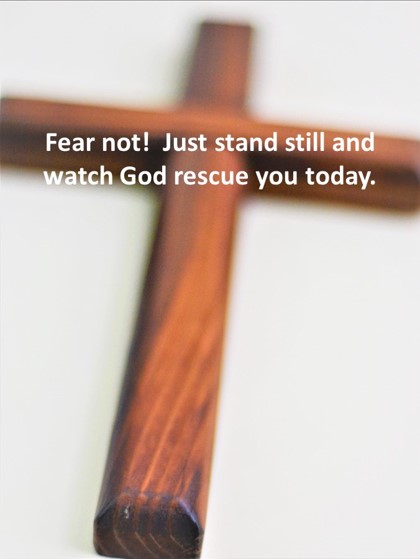
But let him ask in faith, with no doubting, for the one who doubts is like a wave of the sea that is driven and tossed by the wind. (James 1:6)
